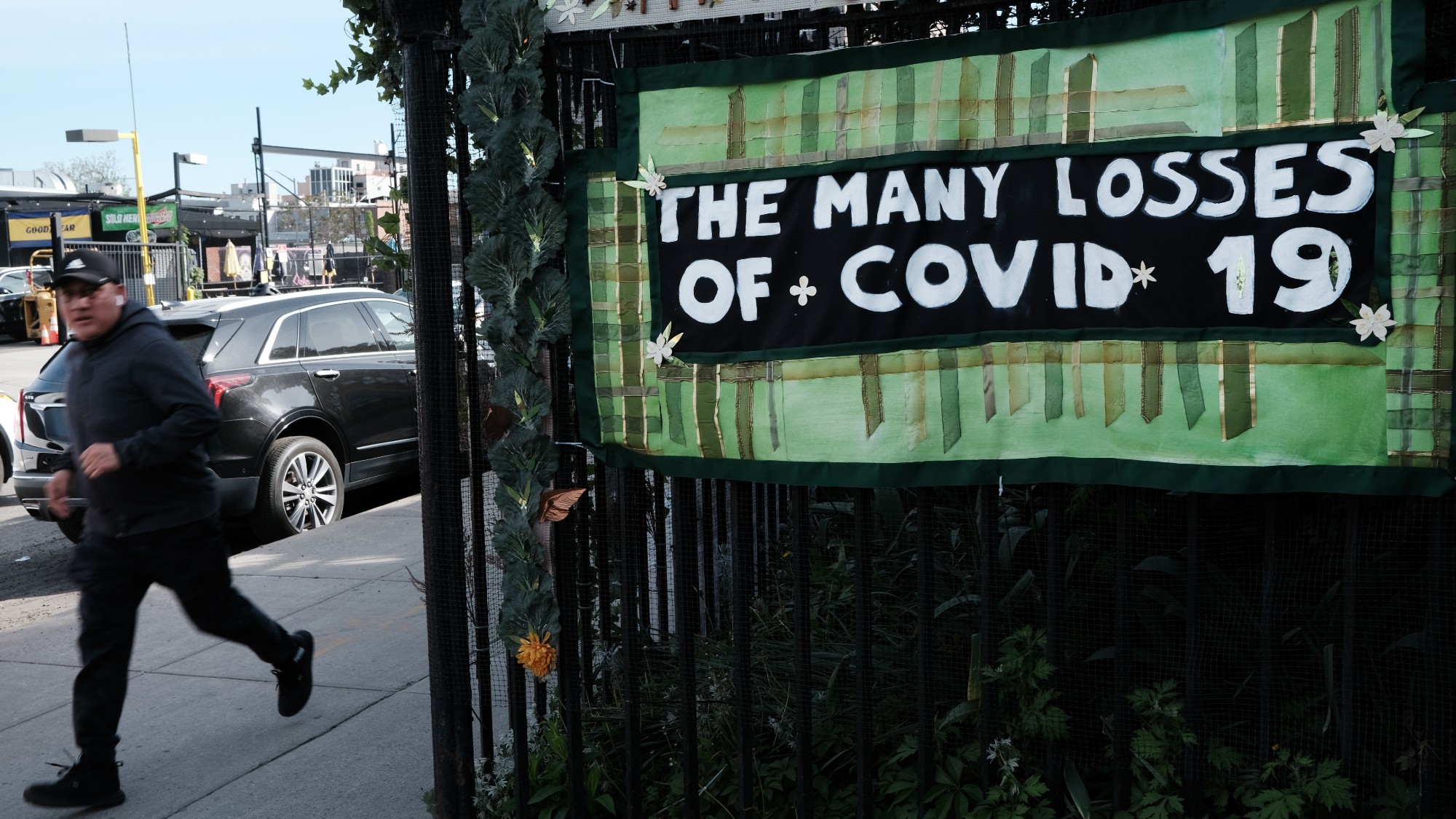How COVID sparked an exhausting battle of ideas
Our pandemic discussions might make a lot more sense if we'd all say what we mean


A free daily email with the biggest news stories of the day – and the best features from TheWeek.com
You are now subscribed
Your newsletter sign-up was successful
Recently, a respected conservative writer published an article arguing in favor of the sick day. That is, not of employers being generous with time off, but rather a defense of actually getting sick:
Do we really want to live in a world in which ordinary, run-of-the-mill cold viruses are forever extinguished? Setting aside the fact that the present cold and flu season — which has persisted in spite of mass masking and social distancing among the public — proves the unfeasibility of such a prospect, it seems obvious that most of us would miss the annual rite of passage that is catching a cold. [The American Conservative]
He further suggests that seeking to avoid illness evinces a certain weakness of character:
If colds disappeared, we would lose one of life's most valuable little trials. Coming down with a cold is invigoratingly unpleasant: the sandpapery throat, the overfull nostrils, the dulling of taste (this is spoken of as if it's a coronavirus-specific symptom, but it's been a feature of every cold I've ever had). Yet it is good that we should suffer so. The experience not only gives the immune system a welcome workout but the soul a necessary lesson in endurance: We are reminded that life will never be entirely free of discomfort … [The American Conservative]
Where does this attitude — one that virtually nobody of any political stripe would have held in a million years before 2020 — come from? I have some suppositions.
The Week
Escape your echo chamber. Get the facts behind the news, plus analysis from multiple perspectives.

Sign up for The Week's Free Newsletters
From our morning news briefing to a weekly Good News Newsletter, get the best of The Week delivered directly to your inbox.
From our morning news briefing to a weekly Good News Newsletter, get the best of The Week delivered directly to your inbox.
If you're an older person, especially if you have kids, the pandemic has without question been brutal. And it is true that a lot of the narrative-setting of pandemic life, with the notable exception of discussion around school closures, has come from the experiences of younger or single or childless people in affluent urban environments. It really isn't so bad to stay in most of the time, buy stuff online, and work from home.
That isn't really viable, though, for a family with children, for whom activities like going to church and getting the kids to school are central to daily life. At some point in 2020, conservatives began to feel that this kind of mainstream American normalcy was being sidelined by the pandemic. They grew concerned that there would not be a return to the pre-pandemic way of doing things.
Masks and public health guidance, in general, have become symbols, for many on the right, of not wanting to let go of the pandemic, and of the looming permanence of so many changes to daily life. And, given the early and sharp partisanship infecting every aspect of this national emergency, everything associated with COVID caution has also become part of the culture war. Out of all of that, somehow, comes the idea that trying not to get sick has some sort of suspicious political and moral valence. It's less a literal statement than a statement of frustration.
There are other extremely odd opinions emanating from portions of the right. For example, the idea that masks are bad because they violate a supposed norm about showing your face in public; that medicine is merely an adjunct to religion; or that avoiding obvious risk of injury or illness is evidence of metaphysical or character weakness.
A free daily email with the biggest news stories of the day – and the best features from TheWeek.com
But there's something else going on here, I think, beyond negative partisanship, or mere frustration leading to hyperbole. There's also a tendency towards abstraction, towards turning practical questions into metaphysical questions, towards seeing everything through the lens of a battle of ideas. For example, comparing mask-wearing to campus safe spaces is amusing, but it pulls us away from looking at the public health issues at hand in a clear-eyed manner. Suggesting that risk is inherent to life, or that the spiritual life is also "essential," raises important questions, but it serves to divert us from very real, specific, and diverse trade-offs people have to make.
The idea of colds as a little trial for the soul is an abstraction. The idea that avoiding potentially risky situations during a pandemic is "safetyism" is an abstraction. Conservatives have a point that the public health profession is extremely risk-averse, and therefore averse to actual cost-benefit calculations. But deeming this "safetyism" merely replaces an actual cost-benefit analysis with an ideologically-fraught characterization.
Ultimately, these are circuitous and mostly useless ways of understanding what is happening on the ground, and of understanding the variety of motives, incentives, and situations that apply to different people in an event like a pandemic. Perhaps this tendency toward abstraction in political chatter is a symptom of people not simply saying what they mean, which in many cases, I suspect, is not really any of these things.
If you're done with COVID — as, after all, much of the country has been for the last year and a half — say so. Perhaps that is not the right answer, but at this point, it is not an unreasonable one.
It is certainly reasonable enough to say straightforwardly.
Addison Del Mastro writes on urbanism and cultural history. Find him on Substack (The Deleted Scenes) and Twitter (@ad_mastro).
-
 How to Get to Heaven from Belfast: a ‘highly entertaining ride’
How to Get to Heaven from Belfast: a ‘highly entertaining ride’The Week Recommends Mystery-comedy from the creator of Derry Girls should be ‘your new binge-watch’
-
 The 8 best TV shows of the 1960s
The 8 best TV shows of the 1960sThe standout shows of this decade take viewers from outer space to the Wild West
-
 Microdramas are booming
Microdramas are boomingUnder the radar Scroll to watch a whole movie
-
 The billionaires’ wealth tax: a catastrophe for California?
The billionaires’ wealth tax: a catastrophe for California?Talking Point Peter Thiel and Larry Page preparing to change state residency
-
 Bari Weiss’ ‘60 Minutes’ scandal is about more than one report
Bari Weiss’ ‘60 Minutes’ scandal is about more than one reportIN THE SPOTLIGHT By blocking an approved segment on a controversial prison holding US deportees in El Salvador, the editor-in-chief of CBS News has become the main story
-
 Has Zohran Mamdani shown the Democrats how to win again?
Has Zohran Mamdani shown the Democrats how to win again?Today’s Big Question New York City mayoral election touted as victory for left-wing populists but moderate centrist wins elsewhere present more complex path for Democratic Party
-
 Millions turn out for anti-Trump ‘No Kings’ rallies
Millions turn out for anti-Trump ‘No Kings’ ralliesSpeed Read An estimated 7 million people participated, 2 million more than at the first ‘No Kings’ protest in June
-
 Ghislaine Maxwell: angling for a Trump pardon
Ghislaine Maxwell: angling for a Trump pardonTalking Point Convicted sex trafficker's testimony could shed new light on president's links to Jeffrey Epstein
-
 The last words and final moments of 40 presidents
The last words and final moments of 40 presidentsThe Explainer Some are eloquent quotes worthy of the holders of the highest office in the nation, and others... aren't
-
 The JFK files: the truth at last?
The JFK files: the truth at last?In The Spotlight More than 64,000 previously classified documents relating the 1963 assassination of John F. Kennedy have been released by the Trump administration
-
 'There is a certain kind of strength in refusing to concede error'
'There is a certain kind of strength in refusing to concede error'instant opinion 'Opinion, comment and editorials of the day'
